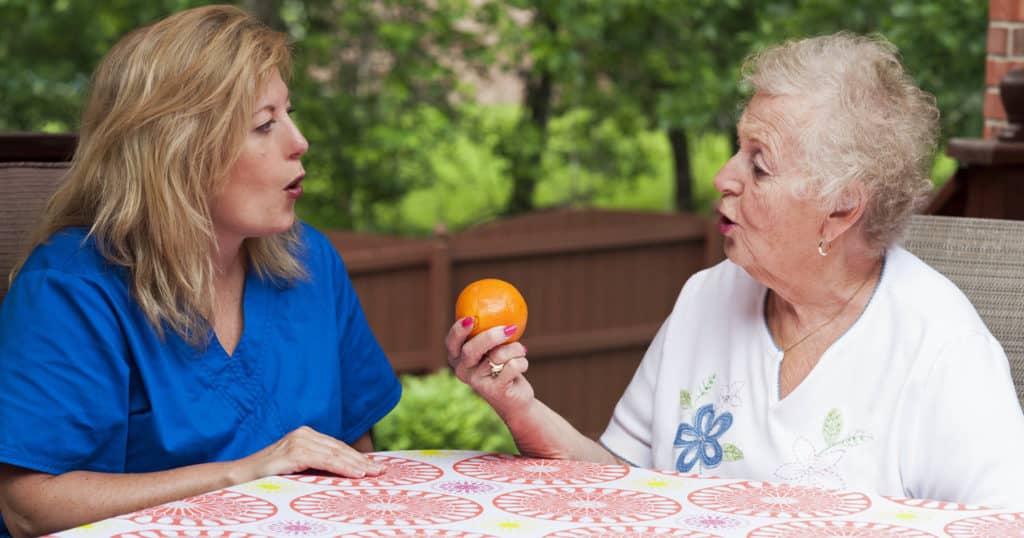Hearing loss, cognitive decline and other issues related to the aging process sometimes make it challenging to communicate effectively with elderly patients. Communicating is essential in building a good relationship with your patients, no matter their age. However, if you regularly work with elderly patients, it’s imperative to learn suitable techniques to overcome communication challenges. Improve how you communicate and help ensure your elderly patients hear and understand what you’re saying with these essential tips.
12 Tips for Improving Communication with Elderly Patients
1. Wait for Acknowledgement
Kera Redlack BN, RN, MHS, is the Director of Health & Wellness at United Active Living senior communities and has dedicated over 15 years to caring for elderly patients. Personal experience has taught her to wait for an acknowledgment before starting a conversation. She explained that waiting before you begin to speak allows older patients to adjust a hearing assistive device or read your lips. However, this advice isn’t just for healthcare providers.
“I worked with a couple once where the wife was irritated that the husband didn’t remember anything she said. Conversely, the husband didn’t recall that the wife had said such things,” explained Redlack. “It turned out to be a matter of the wife speaking to her husband in passing, as she cooked or while a TV program was on and the husband wasn’t aware the wife was speaking and subsequently didn’t hear what she was saying.”

2. Keep Your Face Visible and Enunciate
Never mumble or turn away from a patient you know has difficulty hearing you. Ensuring your patient hears you often hinges on making sure they can see you, too.
“When communicating with elderly patients, always make sure your mouth and lips are visible,” advised Alaine Ross, a registered nurse and co-founder of Sleep Family with over five years of experience working with and caring for elderly patients.
“Don’t attempt talking from a different room or from the side or behind the person,” Ross said. “You want to be positioned directly in front of the patient. Additionally, make sure to speak slowly and really enunciate. Following these two rules will result in much better comprehension because elderly patients will be able to read your lips in addition to listening.”
Kelly Smith, BSN, RN, is the owner and operator of Nestcare, a private duty nursing agency in Sarasota, Florida. She agreed that facing the client when talking and speaking slowly and clearly are key to better communication.
“Ask the client if they can hear you,” added Smith. “This can help you adjust your proximity to them as well as your voice tone. Many older adults struggle not only with hearing but also with processing auditory information. For this reason, I’ve found that speaking slowly while facing directly in front of them helps with these challenges. Allowing the client to see your facial movements also allows for their brain to help them process other non-verbal information at the same time.”
3. Reduce Background Noise
The need to wear a mask throughout the COVID-19 pandemic has been especially rough on those who already have a hard time hearing. Masks muffle your voice and make it impossible to read your lips, requiring nurses to talk louder or make additional adjustments.
When wearing a mask, Redlack suggested that “reducing background noise, like television programs and radios, or moving to an area that’s less crowded, can be critical to ensuring you’re adequately heard. Other approaches like speaking loud and clear in a steady cadence or even using props to help ensure the intended message is portrayed are also helpful.”
4. Utilize Hearing Supports
Consider carrying a pocket talker if you regularly converse with older patients. These assistive listening devices amplify sounds closest to the listener while reducing background noise, making them ideal for one-on-one conversations and/or in situations where you can’t minimize distracting sounds.
“Be aware of hearing challenges and utilize hearing supports,” said Smith. “Many older adults struggle with hearing loss. Encouraging clients to have regular hearing screenings and hearing aid maintenance helps support their needs, especially in healthcare settings. Utilizing hearing devices, such as Bluetooth hearing aid support or speaker support, can also assist in telehealth appointments.”
5. Carry a Notepad
When caring for elderly patients, don’t overlook visual cues that might improve communication, especially for those with hearing loss. Visual cues might include clearly printed written words if the patient doesn’t also have vision or advanced cognitive challenges.
“Patients with hearing loss often feel embarrassed and frustrated if they don’t immediately understand what someone is saying, so always carry a small notepad in your pocket,” Ross instructed. “There will inevitably be times when the patient simply won’t understand what you’re asking or telling them to do. Rather than taking the chance of upsetting the patient by repeating yourself several times, don’t be afraid to pull out your notepad and quickly write a question or set of directions for them to read.”

6. Get Comfortable with Silence
Some patients may hear fine, but something may have impacted their ability to understand both spoken and written language. Hand gestures and pictures may help better facilitate communication. Smith suggested you get comfortable with silence.
“Many older adults may struggle with aphasia or other communication disorders as they age or following a health event, such as a stroke,” she said. “Resist the urge to speak for them. Instead, allow extra time for them to process answers to your questions or to ask questions of their own.”
7. Use Plain Language
Avoiding medical jargon and sticking to laymen’s terms is helpful advice when dealing with any patient. However, it can be especially beneficial when communicating with older adults who may already struggle with simple language. Avoid overloading them by sticking to a single topic and breaking large amounts of information into smaller, more manageable chunks.
Also, don’t keep repeating yourself if an elderly patient doesn’t understand. Instead, rephrase what you’re trying to tell them. Saying something differently may increase their chance of understanding.
Greta Rosler, MSN, RN, NEA-BC, CPXP, is a healthcare leader and certified patient experience professional who supports organizations and other healthcare leaders to maximize patient and clinician experiences through her consulting company, Radius Leaders. She started her career in long-term care and has extensive experience working in hospitals and personal experience in supporting an elderly parent with dementia.
“Communicating with older adults requires brevity as well as plain language,” Rosler advised. “This really applies to anyone in a healthcare setting, but especially elderly individuals, as most people are unfamiliar with the jargon and terminology used.”
8. Ask Elderly Patients to Repeat Instructions
Never assume an elderly patient understood you just because they said they did. They may be too embarrassed to tell you they couldn’t hear you or didn’t understand the words you used.
“Instead of asking if they understand your instructions, ask for them to repeat your instructions to you,” said Smith. “It’s easy to simply ask, ‘Do you understand?’ Many times, older adults will smile and nod, and you may be unaware that they didn’t fully grasp the instructions that were given. However, when you ask them to repeat instructions, such as ‘how often will you take this medication?’ you can better understand how you can support their needs. If a client is unable to repeat the instructions, you may want to give additional support.”
9. Include Everyone in the Conversation
Cognitive impairments also impact communication style, but in different ways than hearing impairments. However, don’t assume someone can’t understand you because they’ve experienced cognitive decline. Redlack says communication techniques vary for each individual and their degree of impairment.
“Maintaining eye contact, sitting at the same level and addressing a person by their preferred name are all successful ways of connecting with an individual,” she said. “Oftentimes, caregivers or family members bypass an individual with a cognitive impairment and exclude them from a conversation, assuming they can’t contribute. This results in feelings of isolation and abandonment.”
Redlack said you should continue to include them but consider integrating smaller yes or no questions or this or that choices into the conversations. Taking these tactics allows them to keep participating in a meaningful way while ensuring they don’t feel excluded.
10. Don’t Make Assumptions
Offending an elderly patient by assuming they can’t hear you can be off-putting and start your relationship off on a sour note. Redlack said it’s important to note that not all older adults experience hearing loss.
“Don’t assume this is the case, and start raising your voice to everyone,” she warned. “Each individual will likely require a unique approach, so avoiding assumptions about a person’s capacity is a good place to start.”

11. Don’t Baby Elderly Patients
In the same vein as continuing to include elderly patients with cognitive decline in conversations and not making assumptions, take care not to minimize an elderly patient’s intelligence simply because they’ve been diagnosed with cognitive impairment. Having reduced cognitive abilities doesn’t mean they can’t understand anything you’re saying.
“With older adults who may experience cognitive decline, speaking slowly is crucial,” emphasized Rosler. “However, it’s also essential that we don’t minimize the intelligence or cognitive ability of someone because of their age. Calling them things like ‘sweetie’ and using baby talk can diminish the relationship, which also diminishes how much they understand about their care.”
12. Follow Up and Give Reminders
Smith’s final advice is to use other communication methods to ensure your message is heard and understood now and remembered later.
“Don’t underestimate the value of writing down information, sending reminders and making follow-up phone calls,” she said. “Healthcare settings are often filled with emotions, such as stress and anxiety, which can make it more difficult to remember details and clearly process information. Using additional supports, such as captions on telehealth visits, written instructions and medication or care plan reminders can also assist with overall communication.”
Have you learned any unique ways to communicate with your elderly patients that have been especially effective? Please share your experience and advice with your fellow nurses in our comments section.
Elevate your career by exploring the latest job openings from top staffing partners on Vivian Health today.










Thank You. My Mother is 89 and has cognitive decline and she is a sweetheart but sometimes makes decisions that could be hazardous. Like walking in inclement weather. I am praying more and hope she understands although I have tried to get through to explain why walking in blizzard like conditions or being gullible to strangers is dangerous. I’m working with Alzheimer Research at UPMC. I will begin to work more hands on with the quality of her health and well being.
Very informative.